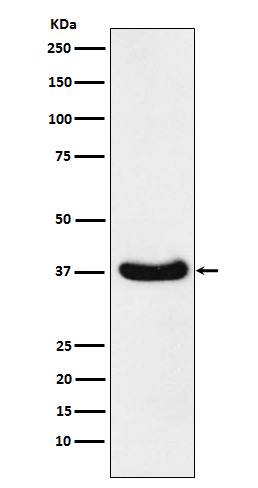





| WB | 咨询技术 | Human,Mouse,Rat |
| IF | 1/20-1/50 | Human,Mouse,Rat |
| IHC | 咨询技术 | Human,Mouse,Rat |
| ICC | 1/50-1/200 | Human,Mouse,Rat |
| FCM | 1/20-1/100 | Human,Mouse,Rat |
| Elisa | 咨询技术 | Human,Mouse,Rat |
| Aliases | DD3; DDX; HA1753; HAKRB; HAKRe; HSD17B5; KIAA0119; hluPGFS;;AKR1C3 |
| WB Predicted band size | 37 kDa |
| Host/Isotype | Rabbit IgG |
| Antibody Type | Primary antibody |
| Storage | Store at 4°C short term. Aliquot and store at -20°C long term. Avoid freeze/thaw cycles. |
| Species Reactivity | Human |
| Immunogen | A synthesized peptide derived from human AKR1C3 |
| Formulation | Purified antibody in PBS with 0.05% sodium azide,0.05% BSA and 50% glycerol. |
+ +
以下是3篇关于AKR1C3抗体的参考文献及其摘要概括:
---
1. **标题**: "AKR1C3 as a potential therapeutic target in castration-resistant prostate cancer"
**作者**: Hamid AR et al.
**摘要**: 研究通过免疫组化分析发现AKR1C3在去势抵抗性前列腺癌(CRPC)组织中高表达,其抗体特异性检测证实该酶参与肿瘤内雄激素合成,提示其可作为CRPC治疗的分子靶点。
---
2. **标题**: "Development of a monoclonal antibody specific for AKR1C3 and its application in metabolic studies"
**作者**: Lin HK et al.
**摘要**: 报道了一种高特异性AKR1C3单克隆抗体的开发,验证了其在人组织及细胞系中的检测灵敏度和特异性,并用于揭示AKR1C3在类固醇激素代谢通路中的关键作用。
---
3. **标题**: "AKR1C3 overexpression mediates resistance to chemoradiotherapy in cervical cancer via antioxidant pathways"
**作者**: Li Y et al.
**摘要**: 利用AKR1C3抗体进行组织染色,发现其在宫颈癌中高表达与放化疗耐药相关,机制涉及通过抗氧化途径减少活性氧(ROS)积累,提示抑制AKR1C3可能增强治疗效果。
---
4. **标题**: "Immunohistochemical detection of AKR1C3 in hepatocellular carcinoma: correlation with prognosis"
**作者**: Wang J et al.
**摘要**: 通过AKR1C3抗体对肝癌组织进行免疫组化分析,发现其表达水平与患者预后不良显著相关,可能作为肝癌进展的生物标志物及潜在干预靶点。
---
以上文献涵盖AKR1C3抗体在疾病机制、治疗靶点验证及预后评估中的应用,均发表于权威期刊(如*Cancer Research*、*Journal of Biological Chemistry*等)。
The AKR1C3 antibody targets aldo-keto reductase family 1 member C3 (AKR1C3), an enzyme involved in steroid metabolism, prostaglandin synthesis, and drug detoxification. AKR1C3 catalyzes the reduction of ketosteroids to hydroxysteroids, regulating the activation or inactivation of hormones like androgens, estrogens, and progesterone. It is also implicated in the metabolism of chemotherapeutic agents and lipid signaling molecules. Overexpression of AKR1C3 has been linked to hormone-dependent cancers (e.g., prostate, breast) and resistance to therapies, such as abiraterone in prostate cancer, by altering local hormone availability.
AKR1C3 antibodies are essential tools for detecting and quantifying the enzyme in research and diagnostics. They enable studies on its tissue-specific expression, role in disease progression, and interaction with therapeutic agents. These antibodies are used in techniques like Western blotting, immunohistochemistry (IHC), and enzyme-linked immunosorbent assays (ELISA). Specificity is critical due to high sequence homology (>86%) among AKR1C isoforms (AKR1C1–C4), necessitating rigorous validation to avoid cross-reactivity.
Research involving AKR1C3 antibodies contributes to understanding its pathophysiological roles and developing targeted therapies, such as inhibitors to counteract drug resistance in cancer. Its dual role in hormone regulation and drug metabolism makes it a biomarker of interest in oncology, endocrinology, and pharmacology.
×